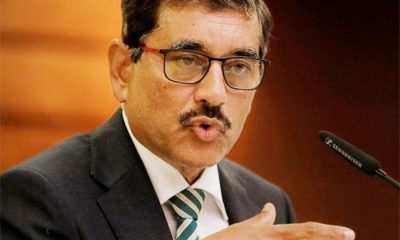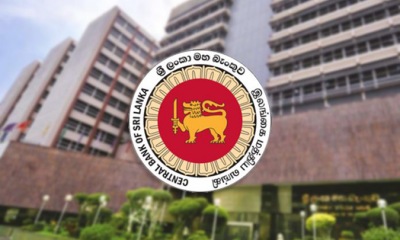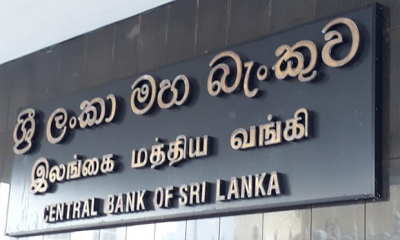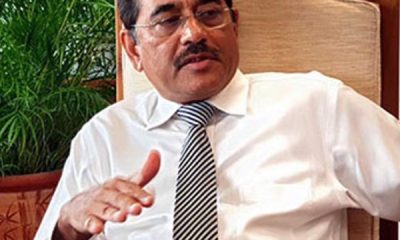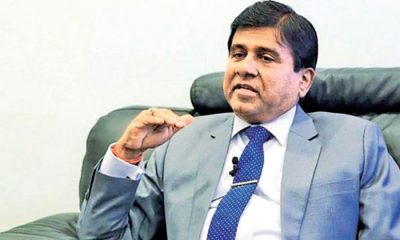News
CB Governor outlines importance of DDR to protect banks and save overall economy

Sri Lankan state can’t allow even a small bank to collapse because that will trigger a bank run with a devastating impact on the economy. Governor of the Central Bank of Sri Lanka CBSL) Dr. Nandalal Weerasinghe said, on Thursday night, taking part in a televised discussion.
Dr. Weerasinghe said that Domestic Debt Restructuring (DDR) would have a negative impact on the balance sheet of the Central Bank of Sri Lanka (CBSL) but by doing this the CBSL had ensured that depositors and pension funds were not adversely affected.
The CBSL Governor said that the stability of the banking sector was of utmost importance to the Central Bank during DDR and that was the reason why it insisted on a five-day banking holiday.
“As everyone knows, Treasury bills and Treasury bonds will be affected by restructuring. Pension funds, banks and private individuals have bought most of these bonds and bills. Treasury bills and treasury bonds are traded every day. Shares of banks are traded on the stock exchange every day. When there is uncertainty about bank assets and Treasury bills and Treasury bonds, this allows some people to manipulate the system. We had to stop that until DDR was done. We need approval by Cabinet, parliamentary committees and Parliament. Both the stock market and bond market must not be operational during this time of uncertainty,” he said.
Dr. Weerasinghe said that by giving banks five days, the government had given space for clarity and transparency, which would allow markets to function optimally. He added that until Parliament approved the DDR, there was also uncertainty and that was why Parliament was meeting during holidays for the first time in Sri Lankan history.
He noted that there were 57 million accounts in Sri Lankan banks and that the total deposits were worth over 15 trillion rupees.
“There was speculation about interest rates, haircuts, etc. The banks have invested in bills and bonds. About 36 trillion rupees have been invested in treasury bills and bonds. We have taken off treasury bills and bonds owned by banks from DDR. There is a good reason for that. Banks pay about 50 percent of their income as tax. Banks could not recover loans of about one trillion during the economic crisis. Moratoriums given during COVID also affected the banks. There was no reason to burden them more. We can’t allow even a small bank to collapse because that will trigger a bank run and that will have a devastating impact on the economy,” he said.
Dr. Weerasinghe said that superannuation funds including the Employees’ Provident Fund (EPF) and the Employees’ Trust Fund (ETF) were subject to a 14% tax rate, which was lower than the tax rate imposed on banks.
The DDR proposes the recalling of all existing Treasury bonds from those funds and issuing new bonds in return and those who chose to participate in the Treasury bond exchange had the option of paying a 30% tax instead of the standard 14 percent tax, the CBSL chief said.
“Superannuation funds pay the government 14 percent a year as tax whereas banks pay 50 percent, personal income tax is 36 percent and corporate tax is 28 percent. We need superannuation funds to make a contribution by increasing the duration of bonds and bills and by a reduction in the interest rates they receive. The EPF holders will not be penalised in any way and the interest rates they receive will remain at about 9 percent, which is the rate they had received in the past years on average,” he said.
The CBSL Governor said that due to high inflation, the real value of deposits had reduced. That was why controlling inflation was important and a main responsibility of the Central Bank, he said. Dr. Weerasinghe said the CBSL actions had helped reduce inflation to about 20 percent and inflation would be reduced to about 10 percent during the next two months.
“If we had not stepped in and stemmed the tide of inflation, the value of almost everything would have been wiped out. This is why we increased interest rates. We have also reduced money printing. Money printing means the CBSL increasing the amount of cash circulating in the economy. This is what we did in 2020-early 2022. This is why inflation rose to 70 percent and CBSL holds close to 2.6 billion treasury bills. We have maintained this by stopping unnecessary money printing. We reduced the expansion of credit, that’s why inflation has dropped,” he said.
The CBSL had purchased Treasury bills worth almost 2.6 trillion from the government, and the CBSL was allowing the government to pay back the money in 15 years instead of one year. The government has to pay the CBSL an additional one trillion given as advances. That, too, would be subjected to the above-mentioned concession, Dr. Weerasinghe said. “This will have a serious impact on the balance sheet of the CBSL. But we are in a better position to manage this because we are a special institution.
“The Treasury bills CBSL has taken is the biggest contributor to the DDR. We take this burden so that the deposits of the people are not affected. We are protecting the banking sector. Furthermore, we have rebuilt the trust in the banking sector.”
Treasury Secretary Mahinda Siriwardana said that Sri Lanka’s economic situation had improved, but there was still a long way to go for the country. In mid-2022, state income wasn’t even enough to cover the basic payments the government had to make, i. e. salaries, pensions, welfare, etc., Siriwardana said, adding that thus the Central Bank had been compelled to issue a lot of Treasury bills to find the money needed by the government.
“We could not borrow from foreign sources. The amount of bills has risen to about 2.6 trillion. We can’t go on doing this. Our budgetary and tax proposals last year were to increase income and reduce expenses,” he said,
Siriwardana said the government had to pay significant amounts of funds to pay interest and debt. Sri Lanka only stopped making some external debt repayments in April 2022, but the government kept on paying loans the country had taken from multilateral organisations, like ADB.
“Not only that, but we need to pay for Treasury bonds and bills. Interest and debt repayments apply continuous pressure on us. DDR aims to reduce these pressures by extending the maturity period, reducing interest rates, and convincing people to take a haircut. Our gross financing need compared to GDP is about 34 percent. Once DDR is done, this is reduced to about 13 percent. This is a 20 percent drop, and we have to pay less interest and debt. We can use the savings for other things. We will receive 700 million dollars from the World Bank and with all these things will improve. We can spend more on health, education and welfare. To achieve this, we need DDR and external debt restructuring,” he said.
R.H.S. Samaratunga, Senior Advisor to the President, also addressing the nation, said that there had been many issues with the Sri Lankan economy for a long time, and things became extremely bad in the past few years due to a combination of wrong economic policies of the Gotabaya Rajapaksa administration as well as developments that took place internationally. By early 2022, the economy had spiralled out of control.
“The economy shrunk, and we had to default in April 2022. There were no feasible alternatives to defaulting, and the government went to the IMF. Sri Lanka held discussions with our creditors for seven months to obtain credit assurances from them. IMF funding only came after we obtained credit assurances from our creditors. Sri Lanka’s total debt stock is over 83 billion US dollars. Out of this, domestic debt is about 42 billion. This debt has to be restructured so that the county can move on,” he said. (RK)
News
US sports envoys to Lanka to champion youth development

The U.S. Embassy in Colombo welcomed the U.S. Sports Envoys to Sri Lanka, former National Basketball Association (NBA) and Women’s National Basketball Association (WNBA) players Stephen Howard and Astou Ndiaye, from June 8 through 14.
The Public Diplomacy section of the U.S. Embassy said that it would launch a weeklong basketball program intended to harness the unifying power of sports, made possible through collaboration with Foundation of Goodness and IImpact Hoop Lab.
While in Sri Lanka, Howard and Ndiaye, both retired professional basketball players, will conduct a weeklong program, Hoops for Hope: Bridging Borders through Basketball. The Sports Envoys will lead basketball clinics and exhibition matches and engage in leadership sessions in Colombo and Southern Province for youth aged 14-18 from Northern, Uva, Eastern and Western Provinces, offering skills and leadership training both on and off the court. The U.S. Envoys will also share their expertise with the Sri Lanka Basketball Federation, national coaches, and players, furthering the development of basketball in the country. Beyond the clinics, they will collaborate with Sri Lankan schoolchildren to take part in a community service project in the Colombo area.
“We are so proud to welcome Stephen and Astou as our Sports Envoys to Sri Lanka, to build on the strong people-to-people connections between the United States and Sri Lanka,” said U.S. Ambassador Julie Chung. “The lessons that will be shared by our Sports Envoys – communication, teamwork, resilience, inclusion, and conflict resolution – are essential for leadership development, community building, equality, and peace. The U.S. Sports Envoy program is a testament to our belief that sports can be a powerful tool in promoting peace and unity.”
News
Rahuman questions sudden cancellation of leave of CEB employees

SJB Colombo District MP Mujibur Rahuman in parliament demanded to know from the government the reasons for CEB suspending the leave of all its employees until further notice from Thursday.
MP Rahuman said that the CEB has got an acting General Manager anew and the latter yesterday morning issued a circular suspending leave of all CEB employees with immediate effect until further notice.
“We demand that Minister Kanchana Wijesekera should explain this to the House. This circular was issued while this debate on the new Electricity Amendment Bill was pending. There are many who oppose this Bill. The Minister must tell parliament the reason for the urge to cancel the leave of CEB employees,” the MP said.However, Speaker Mahinda Yapa Abeywardena prevented Minister Wijesekera responding to the query and said that the matter raised by MP Rahuman was not relevant.
News
CIPM successfully concludes 8th Annual Symposium

The Chartered Institute of Personnel Management (CIPM) successfully concluded the 8th Annual CIPM Symposium, which took place on 31st May 2024. Themed “Nurturing the Human Element—Redefining HRM in a Rapidly Changing World,” the symposium underscored the pivotal role of human resource management (HRM) in today’s dynamic global landscape. Since its inception in 1959, CIPM has been dedicated to advancing the HR profession through education, professional development, and advocacy, solidifying its position as Sri Lanka’s leading professional body for HRM.
Ken Vijayakumar, the President of the CIPM, graced the occasion as the chief guest. The symposium commenced with the welcome address by the Chairperson, Prof. Arosha Adikaram, followed by the Web Launch of the Symposium Proceedings and Abstract Book by the CIPM President. The event featured distinguished addresses, including a speech by Chief Guest Ken Vijayakumar, President of CIPM, and an address by Guest of Honor Shakthi Ranatunga, Chief Operating Officer of MAS Holdings Pvt. Ltd., Sri Lanka.
The symposium also featured an inspiring keynote address by Prof. Mario Fernando, Professor of Management and Director of the Centre for Cross Cultural Management (CCCM) at the University of Wollongong, Australia.
Vote of Thanks of the inauguration session was delivered by Dr. Dillanjani Weeratunga, Symposium Co-chair.
The symposium served as a comprehensive platform for researchers to present their findings across a wide range of critical topics in HRM. These included Cultural Diversity and Inclusion, Talent Development and Retention, Ethical Leadership and Corporate Social Responsibility, Adapting to Technological Advancements, Mental Health and Well-being at Work, Global Workforce Challenges, Employee Empowerment, and Reskilling and Upskilling.
The plenary session was led by Prof. Wasantha Rajapakse. Certificates were awarded to the best paper presenters during the valedictory session, followed by a vote of thanks delivered by Kamani Perera, Manager of Research and Development.
The annual symposium of CIPM was a truly inclusive event, attracting a diverse audience that spanned undergraduates, graduates, working professionals, research scholars and lecturers. This widespread interest highlights the symposium’s significance in the field of HRM, offering a unique opportunity for everyone to network and learn from scholarly brains.The CIPM International Research Symposium was sponsored by Hambantota International Port, Sri Lanka Institute of Information Technology (SLIIT), E B Creasy & Co. PLC, and Print Xcel Company.


